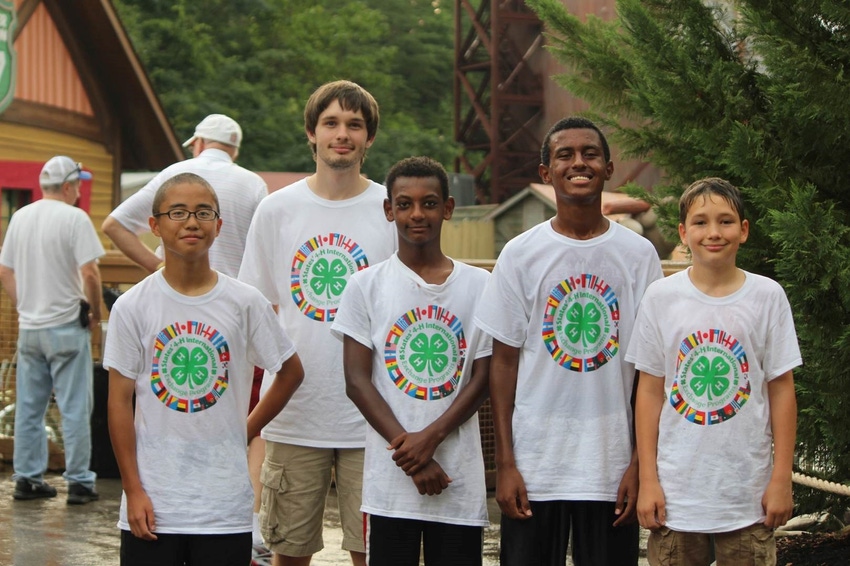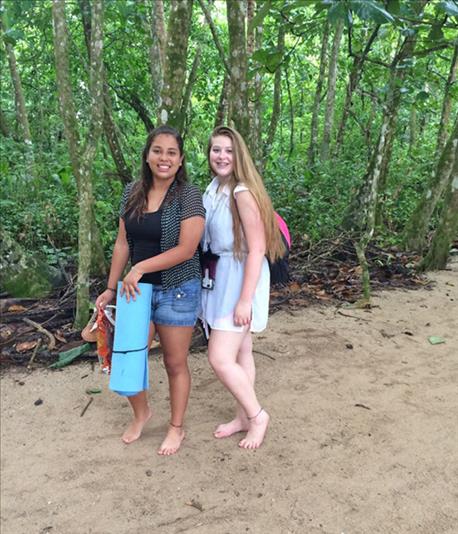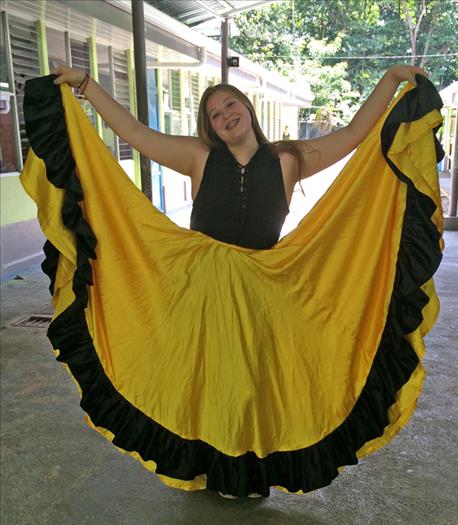
Piper Killingsworth stepped out of a car, walked across the parking lot and entered the back seat of another vehicle. She said, "Hola." No one spoke. Then — finally — the man in the driver's seat broke the silence. "He spoke English fairly well, but the others did not," says Killingsworth.
It was a long car ride to Sarapiqui, a rural community in Costa Rica. Killingsworth had seen a picture of her host family and knew their names, but did not know how she was going to communicate. She took some Spanish classes, but did not consider herself fluent in the language. Immediately, she could tell that this States' 4-H International Exchange Program was going to be a learning experience.
 TRAVEL ABROAD: States' 4-H International Exchange Program offers 4-H members the opportunity to immerse themselves in another culture. The program started in 1972. It offers both summer and school-year opportunities.
TRAVEL ABROAD: States' 4-H International Exchange Program offers 4-H members the opportunity to immerse themselves in another culture. The program started in 1972. It offers both summer and school-year opportunities.
The 15-year-old says it took roughly one-and-a-half weeks to work through the frustration between her host family and her regarding the language barrier. Then her international experience took off, proving to be the trip of a lifetime.
Exploring the culture
The idea behind the States' 4-H International Exchange Program, which began back in 1972, is to enhance members' understanding of the world and global citizenship through 4-H cultural immersion. "They want us to know what everyday life is like for kids like us from other parts of the world," Killingsworth explains. "I basically followed my host sister around. When she went to school, I went to school. When she hung out with her friends, I would hang out with her friends. If the family went to a movie or out to eat, I went right along with them. I was to follow them around and not only see, but also experience their culture."
 FINDING FAMILY: Piper Killingsworth, along with her host sister, Ruby, overcame a language barrier and explored Costa Rica for four weeks this summer. (Photo courtesy Piper Killingsworth)
FINDING FAMILY: Piper Killingsworth, along with her host sister, Ruby, overcame a language barrier and explored Costa Rica for four weeks this summer. (Photo courtesy Piper Killingsworth)
Her host family lived in a very rural area with a small school. The location was similar to Killingsworth's hometown of Lawson, but she laughs when pointing out that "it was a lot more tropical."
She found it odd when residents would walk up to banana trees, cut down a bunch, load it into a car and drive off. "I don't think it was stealing," she says, "because everyone was doing it."
It also took a while to get used to the transportation infrastructure. "There were no two land bridges," she says, "only one lane. So you had to stop every time to wait for a car to cross."
The streets were "paved" with large stones. "You could not really talk in the car because the road noise was so bad," she adds. "There was a lot of yelling in the car. It was a little different than a car drive in America."
 DRESSING THE PART: Piper Killingsworth traveled to Costa Rica in the summer of 2016 as part of the States' 4-H International Exchange Program. She got caught up in the culture all the way to her clothing. (Photo courtesy Piper Killingsworth)
DRESSING THE PART: Piper Killingsworth traveled to Costa Rica in the summer of 2016 as part of the States' 4-H International Exchange Program. She got caught up in the culture all the way to her clothing. (Photo courtesy Piper Killingsworth)
Finding the incredible
Killingsworth spent four weeks during June and July 2016 in Costa Rica. She found the greatest joy during her trips to school with her host sister. "Right behind the school is a rainforest," she says. "There was a trail into the forest. You could see monkeys and all kinds of birds there." But it was a night outing that left a lasting impression on the Olde Tyme 4-H member.
The school took an evening hike into the rainforest. "It was completely dark," she says. "We all had headlamps strapped around our foreheads." At one point in the trek, the school instructor asked that all of the students turn off their lights and stand still.
"All of a sudden the plants around us started to light up," she says. "The rainforest started lighting up."
It was bioluminescent fungi, a type of fungi typically found in temperate or tropical climates. It emits a greenish light. "It was incredible," she says.
While Killingsworth says the trip was not a vacation by any means, she says it was a great learning experience. "You are there to see the everyday life of an average Costa Rican student," she says. "It is good to see what others around the world go through, the struggles they may have."
Fulfilling a future
Killingsworth recalls being told in school that her generation would never understand the severity of things for people in developing nations. But after visiting Costa Rica, she now appreciates life in the U.S.
"Honestly, we are entitled," she says. "For us, if we are hungry, we drive to town and go to McDonald's. For us, it can be a daily event. For those in Costa Rica it is a weekly event, if at all. I am taking fewer things for granted. I am realizing just how outstanding things really are here."
A junior at Lawson High School, Killingsworth knows her future career path includes more trips like this one. "I personally want to be involved in Doctors Without Borders," she says. Her desire is to be a pediatrician in Africa. To that end, she will take more foreign language classes to try and help bridge the language barrier that plagued her on this trip. Killingsworth is determined to interact with her patients from the start.
"Now that I have been over there and seen people in other countries and their struggles, it makes me want to help more," she says." Doctors Without Borders offers that."
About the Author(s)
You May Also Like






